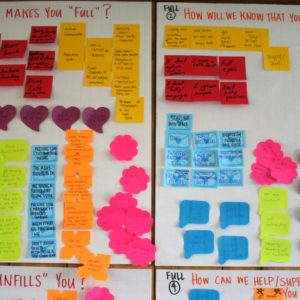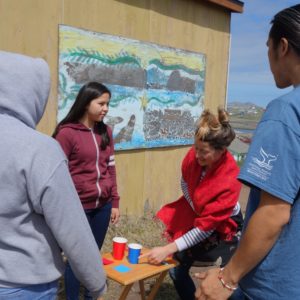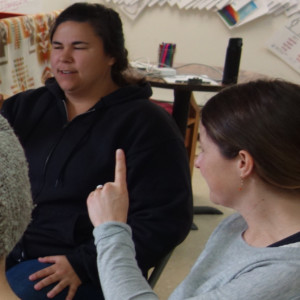
Cedar Edwards has worked with WAYK at several summer revitalization programs. They work as a software engineer in New York City and spends most of their time pulling language from unsuspecting passersby.
Last year, I spent a few months working in Washington D.C. with a coworker who spoke fluent French. I spoke no French at all, so we lasted about nine minutes before I started pulling French from him at every opportunity.
I laid out TQ: Law of the Jungle:
“In this game, there are three rules. First: Don’t use English. Don’t translate or explain anything, no matter how strong the urge! Second: If you can tell what I’m trying to say, but I’m not saying the right thing, tell me what to say instead. And third: Whenever you can, speak in simple, complete sentences, like a mom would say to a two-year-old.”
We got off to a beautiful start. We both rode the metro to work, which meant that every evening, we got to have a TQ: Same Conversation as we walked to the metro station. My friend started to get the hang of this whole “hunting” business, got good at recognizing when I was using TQ:Mumble to fish for a correction, and had a lot of laughs watching me fumble my way through increasingly outrageous Set Ups.
Not too long after we started, I found a gap in my French: I didn’t know how to ask my friend what kind of day he’d had.
So, one day as we headed for the metro, I got ready to TQ: Bait the Trap. Previously, on a lunch break, I had learned how to ask how my friend’s salad tasted. I figured the same question would make for a sufficiently obvious mumble if I asked about a day instead of a salad, and I had already learned the word for “day”: jour.
So as we left the office building, I gave it a shot–and my friend squinted at me and laughed, and then this conversation happened (all in French):
“I understand, but that was very wrong.”
“I thought so. What should I say?”
“You should say, ‘How did your journée go?'”
That caught my attention! I had never heard the word journée before. My friend must have seen the question on my face, because he tried to bend the first Rule of the Jungle by explaining the grammar of jour and journée in French.
Most of what he said went clear over my head, of course. But between a couple of English cognates and familiar glue words, I was able to put together the gist of what he was saying:
“A ‘jour’ is a day when it’s a thing, and a ‘journée’ is a day when it’s a duration.”
Now that was interesting…but also pretty meaningless to me. When is a day a duration, and when is a day a thing? There was only one way to find out: TQ: Prove It!
So I started thinking of all the things I knew how to say that involved durations of days, and tried them out with journée.
“If I walked from here to New York City, it would take seven journée.”
My friend flinched. “No, seven jour.” Swing and a miss.
“I have been working on this project for many journée.”
Another flinch. “No, many jour.” No dice.
Try after try, no matter what kind of “duration” I came up with, journée was never the right word–it was always jour. In fact, the only sentence I could find that used journée was asking whether my friend had a good day, which to my mind seemed an awful lot like a “thing” rather than a duration!
I was laughing throughout the whole exchange, and even though every guess I tried got shot down, I’d been playing this game long enough not to get discouraged. Of the two of us, my friend was seemingly more bothered that I was still having trouble.
I chose that moment to switch back into English for a chat about the meta-game:
“I’m not worried about this,” I told him. “This is the rule that I’m going to keep in my head: Always use jour, except when you’re asking how someone’s day went. When you do that, use journée.”
“But that’s not right!”
“I know. Which means that some day in the future, I’m going to be talking with a French speaker (probably you), and I’m going to follow my rule and say jour, and they’re going to make a face because I should have said journée—and that will be very interesting! In that moment, I will have a new data point to help me figure out journée. Until then, my rule will work fine.”
This technique is difficult for adult learners to come to grips with. We are bothered by uncertainty, by being wrong, and so the moment we learn that something exists, we insist on knowing why it exists. We can’t just use journée in a sentence without knowing why we’re saying that instead of jour!
This is why, when someone is hunting from me and asks, “But why do you say it that way?”, I answer:
“There is no why. There is only when.”
I didn’t need to know why I was saying journée. I only needed to know that when I asked about someone’s day, I should use journée.
The “why” behind a piece of language exists in the terms of that language, and it probably won’t fit into the terms of your native language nicely. When I tried to guess “durations” that would use journée, I was using my English brain’s ideas of duration, none of which appeared to fit the French idea of “duration” that lives in journée.
This idea is important: The problem was not that my friend’s explanation was incorrect. I have full confidence that jour really is a thing-like day and journée is a duration-like day. The problem was just that my English-thinking brain had not yet grown into a French understanding of what thing-like and duration-like mean.
(In the first Pirates of the Caribbean movie, the heroes must travel to Isla de Muerta, a magical island that can only be found by those that already know where it is. The great majority of the time, grammatical explanations are the same way: they make perfect sense, but only to those who already understand them.)
Sometimes people interpret this to mean that other languages are inscrutable, mysterious, and impossible to truly, deeply learn. (You hear this in articles about how “If you don’t learn another language by X age, you’ll never really learn it.”) But that isn’t the case at all. You are a member of homo sapiens, and the biggest superpower our species has is taking in gulps of rich, complex information, seeing the patterns hiding within, and building magnificent systems of symbols and metaphor out of those patterns. Your brain has never lost the ability to do this. You do it every day, all the time. All you have to do is feed your brain the right material, then sit back and let it work.
To do this while learning a language, let go of why, and focus on when. You noticed that there’s a funny syllable that sometimes shows up on the ends of words? Don’t worry about why words have it–focus on when they do. The ending was there when you were pouring tea and ran out of water, but it wasn’t there when you came downstairs and the kettle was already empty. The ending was there when you ran onto the subway platform and just missed the train, but not when you came down and there was no train in sight.
(Notice also that this kind of understanding, knowing when to speak a certain way even if you don’t have an explanation for why it’s so, is completely sufficient for conversing with other speakers. No fluent speaker is going to turn on you after you successfully say the right thing to demand you explain the grammar of what you correctly said—you’ll be too busy pouring more water, or catching the next train.)
But won’t all those situations be too much to remember? Not likely. Especially if you’re using TQ: Same Conversation, you’ll have lots of opportunities to see the same situations again and again–and your brain is built for picking up those kinds of details in situations where work needs to get done. Just relax, set up a Needs Gap, and keep speaking.
Notice when you’re right, notice when you’re wrong, and don’t worry if you can’t explain why. Over time, your brain will work its wonderful human brain-magic on all of the whens, and the why will crystallize on its own, in its own terms. That is what fluency feels like.
Best of luck, and have a great journée!




